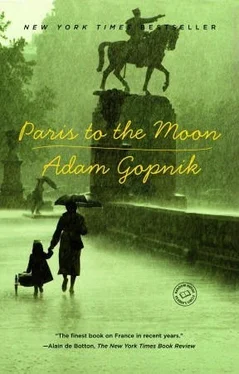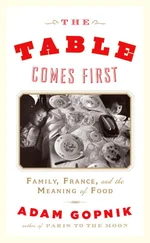I, soothing: “Oh, I know you have.”
Suspicious: “You mean your editor double-checks?”
“No, no, it’s just a way of making sure that we haven’t made a mistake in facts.”
More wary and curious: “This is a way of maintaining an ideological line?”
“No, no—well, in a sense I suppose…” (For positivism, of which New Yorker fact checking is the last redoubt, is an ideological line; I’ve lived long enough in France to see that move coming….)
“But really,” I go on, “it’s just to make sure that your dates and what we have you quoted as saying are accurate. Just to be sure.”
Dubious look; there is More Here Than Meets the Eye. On occasion I even get a helpful, warning call from the subject after the fact checker has called. “You know, someone, another reporter called me from the magazine. They were checking up on you.” (“No, no, really checking on you,” I want to say, offended, but don’t—and then think he’s right: They are checking up on me too; never thought of it that way, though.) There is a certainty in France that what assumes the guise of transparent positivism, fact checking,” is in fact a complicated plot of one kind or another, a way of enforcing ideological coherence. That there might really be facts worth checking is an obvious and annoying absurdity; it would be naive to think otherwise.
I was baffled and exasperated by this until it occurred to me that you would get exactly the same incomprehension and suspicion if you told American intellectuals and politicians, postinter-view, that a theory checker would be calling them. “It’s been a pleasure speaking to you,” you’d say to Al Gore or Mayor Giuliani. “And I’m going to write this up; probably in a couple of weeks a theory checker will be in touch with you.”
Alarmed, suspicious: “A what?”
“You know, a theory checker. Just someone to make sure that all your premises agree with your conclusions, that there aren’t any obvious errors of logic in your argument, that all your allusions flow together in a coherent stream—that kind of thing.”
“What do you mean?” the American would say, alarmed. “Of course they do, I don’t need to talk to a theory checker.”
“Oh, no, you don’t need to. It’s for your protection, really. They just want to make sure that the theory hangs together….”
The American subject would be exactly as startled and annoyed at the idea of being investigated by a theory checker as the French are by being harassed by a fact checker, since this process would claim some special status, some “privileged” place for theory. A theory checker? What an absurd waste of time, since it’s apparent (to us Americans) that people don’t speak in theories, that the theories they employ change, flexibly, and of necessity, from moment to moment in conversation, that the notion of limiting conversation to a rigid rule of theoretical constancy is an absurd denial of what conversation is.
Well, replace fact (and factual) for theory in that last sentence, and you have the common French view of fact checking. People don’t speak in straight facts; the facts they employ to enforce their truths change, flexibly and with varying emphasis, as the conversation changes, and the notion of limiting conversation to a rigid rule of pure factual consistency is an absurd denial of what conversation is. Not, of course, that the French intellectual doesn’t use and respect facts, up to a useful point, any more than even the last remaining American positivist doesn’t use and respect theory, up to a point. It’s simply the fetishizing of one term in the game of conversation that strikes the French funny. Conversation is an organic, improvised web of fact and theory, and to pick out one bit of it for microscopic overexamination is typically American overearnest comedy.
“Does this bus go across the river?” the man from Chicago demands of the Parisian bus driver, who looks blank. “I said, this bus goes across the river, or doesn’t it?” I myself have been in this position, of course, more times than once, in Venice and in Tuscany, but (I choose to believe, at least) I try to make up for it with the necessary abasing looks of ignorance and sorrow and multitudes of thank-yous and head ducks, as the Japanese do here. The American in Paris just demands, querulously—“Now, you remember that pastry I showed you in the window. Now, I want that one”—in English, and expects the world to answer.
Sometimes the French response is muttered and comic. “Hey, does this bus go across the river?” the woman from California says, mounting onto the steps of the 63. “I wouldn’t come to your country and not speak in your language,” the driver says, in French. A sensitive listener would detect some frost in the manner, but the American woman doesn’t: “No—I asked you, does this bus go across the river?” Or, worse, Americans ordering in English at French menus, specifying precisely, exigently, what they want in a language the waiters don’t speak.
For it turns out that there is a Regulon in the Semiosphere stronger even than the plug, more agile than the fish. It’s language. Language really does prevent signs or cultures from going universal. For all the endless articles in the papers and magazines about the force of globalization and international standardization, language divides and confuses people as effectively now as it ever has. It stops the fatal “exponentiality” of culture in the real world as surely as starvation stops it in the jungle. It divides absolutely, and what is really international, truly global, is, in this way, very small.
The real “crisis” in France in fact is not economic (France is in a cyclical slump; it will end) or even cultural (France is in a cyclical slump; it will end) but linguistic. French has diminished as an international language, and this will not end. When people talk about globalization, what they’re really saying is that an English-speaking imperium now stretches from Adelaide to Vancouver, and that anyone who is at home in one bit of it is likely to feel at home in the other bits. You can join this global community by speaking English yourself, but that’s about all. The space between the average Frenchman (or Italian or German) and the average American is just as great as it’s ever been, because language remains in place, and it remains hard. Even after two years of speaking French all the time, I feel it. We breathe in our first language, and swim in our second.
Yet there is a kind of authority associated with the American presence right now that is both awe-inspiring and absurd. At the Bastille Day fireworks, for instance, over on the champ-de-Mars, there is always a nice big picnic feeling, but no one pays minimal respect to the notion that people ought not to stand up in front of other people when other people are trying to watch fireworks. As happens so often in France, it is a designated bacchanal, like the playground in the Luxembourg Gardens. At the Bastille Day on the champ-de-Mars this July, in the midst of the anarchy—over on the fringes, of course, there were flies, gendarmes, busy arresting the vendors of those glow-in-the-dark necklaces; now, there was a real crime—a single American woman rose to bring order to the multitudes. She was the kind of big-boned East Coast woman you see running a progressive day camp, or working as the phys ed instructor at Dalton or Brearley, high-flown but (as she would be the first to tell you) down-to-earth. She just started ordering people around: Sit down, you down there (all this in English, of course), now make room so the little kids can see etc. And people, at least the few hundred in earshot, actually did it. They obeyed, for a little while anyway.
Читать дальше












